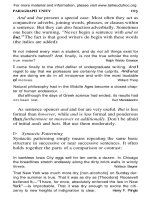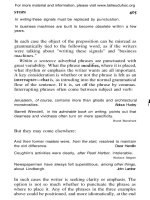Tài liệu Essential guide to writing part 19 pdf
Bạn đang xem bản rút gọn của tài liệu. Xem và tải ngay bản đầy đủ của tài liệu tại đây (280.88 KB, 15 trang )
DICTION
is an attempt to cast a verbal spell over the job of quality
control in a watch factory. This is shorter, simpler, and
clearer:
A worker checks the watch's accuracy.
Confusion about the subject also leads to wordiness:
Music is similar to dress fads in that its styles change from time to
time. Perhaps the change is subtle, but no one style of music will
remain on top for a very long time. am not talking about classical
music, but rather about popular music that appeals to the majority
of young people.
This writer did not begin with word specific enough his
subject. He chose too general a term ("music"). The final
sentence reveals that he himself felt the problem, for he spends
twenty words explaining what kind of music he means. How
much easier to have begun
Popular music is similar to dress fads. . . .
Sometimes deadwood stems from ignorance of words.
That's the problem here:
In this novel, part of the theme is stated directly in so many words,
and part is not so much said in specific words but is more or less
hinted at.
Had the writer known the terms explicit and implicit he could
have made the point more clearly and concisely:
In this novel, part of the theme is explicit, and part is implicit.
A limited vocabulary is no disgrace. We all suffer that hand-
icap, and education is the process of overcoming it. But while
it may be pardonable, not knowing the right word often re-
For more material and information, please visit www.tailieuduhoc.org
CONCISION
suits in obscurity deadwood. It helps to keep a list of
pairs like explicit and implicit which enable you to make dis-
tinctions quickly and neatly:
stract, are other examples.
Finally, excessive caution contributes to deadwood. Some
people are afraid to express anything as certain. They will
write:
It seems that Columbus discovered the New World in 1492.
Certainly some things call for caution. But no one can lay
down a blanket rule about when qualification is necessary and
when it is verbose. We'll consider the question in closer detail
later in the chapter; for the moment remember that extreme
caution in writing is more often a vice than a virtue.
A false sense of what is significant, confusion about what
you want to say, ignorance of words, and timidity, then, are
some of the psychological factors leading to deadwood. In
practice, they are manifested in either of two ways: circum-
locution, using too many words to say something; point-
lessness, saying something that doesn't need to be said at all.
Circumlocution
> Avoid Strings of Verbs
English often conveys subtleties by stringing verbs:
was going to go tomorrow.
Here the verbs are justified by the meaning (that a planned
future action is now uncertain or negated). But when a string
of verbs says nothing that cannot be said with equal clarity
or force in fewer words, the result is deadwood:
The current foreign situation should serve to start many Americans
to begin thinking.
BETTER: ... should start many Americans thinking.
For more material and information, please visit www.tailieuduhoc.org
DICTION
Nucleonics investigates the smaller particles that go to make up the
nucleus of the atom.
BETTER: . .. that make up the nucleus of the atom.
A special case of empty verb strings is the awkward passive
construction. The focus of thought or tact may make the pas-
sive voice necessary. Generally, however, you should write in
the active voice. Overuse of the passive lards sentences with
empty words:
The writer's point must be clearly stated by him at the beginning
of the paragraph.
BETTER: The writer must clearly state his point at the beginning of
the paragraph.
The work must be done by her by tomorrow.
BETTER: She must do the work by tomorrow.
(In the last example, however, note that if one wished to em-
phasize "work," the passive would be justified.)
The Best Is Concise and Direct
In practice this principle often boils down to not using a
phrase if a word will do:
She conducted herself in an irrational manner.
BETTER: She conducted herself irrationally.
BETTER YET: She acted irrationally.
He didn't take the advice given to him by his doctor.
BETTER: He didn't take his doctor's advice.
leaves us with the thought that. ...
BETTER: leaves us thinking that....
A common kind of adjectival wordiness is using a full rel-
ative clause to introduce a participle or adjective that could
be attached directly to the noun:
For more material and information, please visit www.tailieuduhoc.org
CONCISION 285
This is the same idea that was suggested last week.
BETTER: This is the same idea suggested last week.
The family who are living in that house are my friends.
BETTER: The family living in that house are my friends.
In such clauses the relative word (that, which, who) acts as
the subject and is immediately followed by a form of be which
is, in turn, followed by a participle or adjective. The relative
word the verb contribute nothing except to hook the
adjective or participle to the noun. Occasionally clarity, em-
phasis, or rhythm justify the whole clause. Mostly they do
not.
The direct, economic use of participles is a resource of style
that inexperienced writers underuse. The economy also ap-
plies to adverbial clauses, which can sometimes be boiled
down to one or two operative words:
Because they lacked experience, they didn't do a good job.
BETTER: Lacking experience, they didn't do a good job.
Now and then, independent clauses or separate sentences
may be pruned and subordinated by means of participles:
These ideas are out of date, and they don't tell us anything new.
BETTER: These ideas are out of date, telling us nothing new.
Participles are also more economical than gerunds (the
nounal use of the -ing form of a verb; see
She worried about the cooking of the dinner.
BETTER: She worried about cooking the dinner.
Note, however, that you must consider meaning in such re-
visions. "She worried about the cooking of the dinner" would
make sense if someone else were doing the cooking.
For more material and information, please visit www.tailieuduhoc.org
DICTION
Specificity Means Concision
Beginning with a word too general for your idea creates a
need for wordy modification:
People who enter college for the first time find it difficult to adjust
to the teaching.
"People" is too inclusive. To specify what kind of "people,"
the writer must add seven words. English provides no single
term meaning "people who enter college for the first time"
(except matriculants, a Latinism too forbidding for this
writer's purpose). Students, however, would be more precise
than people, and freshmen, more precise still (even though
second-semester freshmen are not, strictly speaking, entering
college for the first time). With freshmen only one modifier
is needed:
College freshmen find it difficult to adjust to the teaching.
While most frequent with nouns, failure to be specific oc-
curs with verbs as well:
The sudden change motivated him into a rage.
BETTER: The sudden change enraged him.
They emerged victorious.
BETTER: They won.
The too-general verb is often a form of he, have, or seem.
When these merely link a noun or modifier to the subject,
they can often be replaced by a more exact verb:
The people were supportive of conservation.
BETTER: The people supported conservation.
Officers have to have a knowledge their men.
BETTER: Officers have to know their men.
For more material and information, please visit www.tailieuduhoc.org
CONCISION
Keep Prepositions and Conjunctions Brief
connectives grow like weeds if you do not pull them:
More than one game has been decided on the basis of a fumble.
BETTER: . .. decided by a fumble.
Wordy equivalents for because, and so are particularly
common:
The bill failed as a result of the fact that the Senate was
misinformed.
BETTER: ... because the Senate was misinformed.
She will show us the way in which to do it.
BETTER: She will show us how to do it.
He becomes self-conscious to the extent that he withdraws into
himself.
BETTER: He becomes so self-conscious that he withdraws into
himself.
Pointlessness
Pointless words serve no purpose. They do not need to be
made more concise; they need to be eliminated. There are two
broad causes of pointless diction: (1) failing to credit readers'
intelligence, and (2) failing to focus on the subject.
Failing to Credit Readers' Intelligence
Think about your readers, and avoid telling them what they
already know or can easily infer from the context.
Don't Define What Is Common Knowledge
Accountants sometimes function as auditors (people from outside a
company who check the books kept by the company's own
accountants).
For more material and information, please visit www.tailieuduhoc.org









